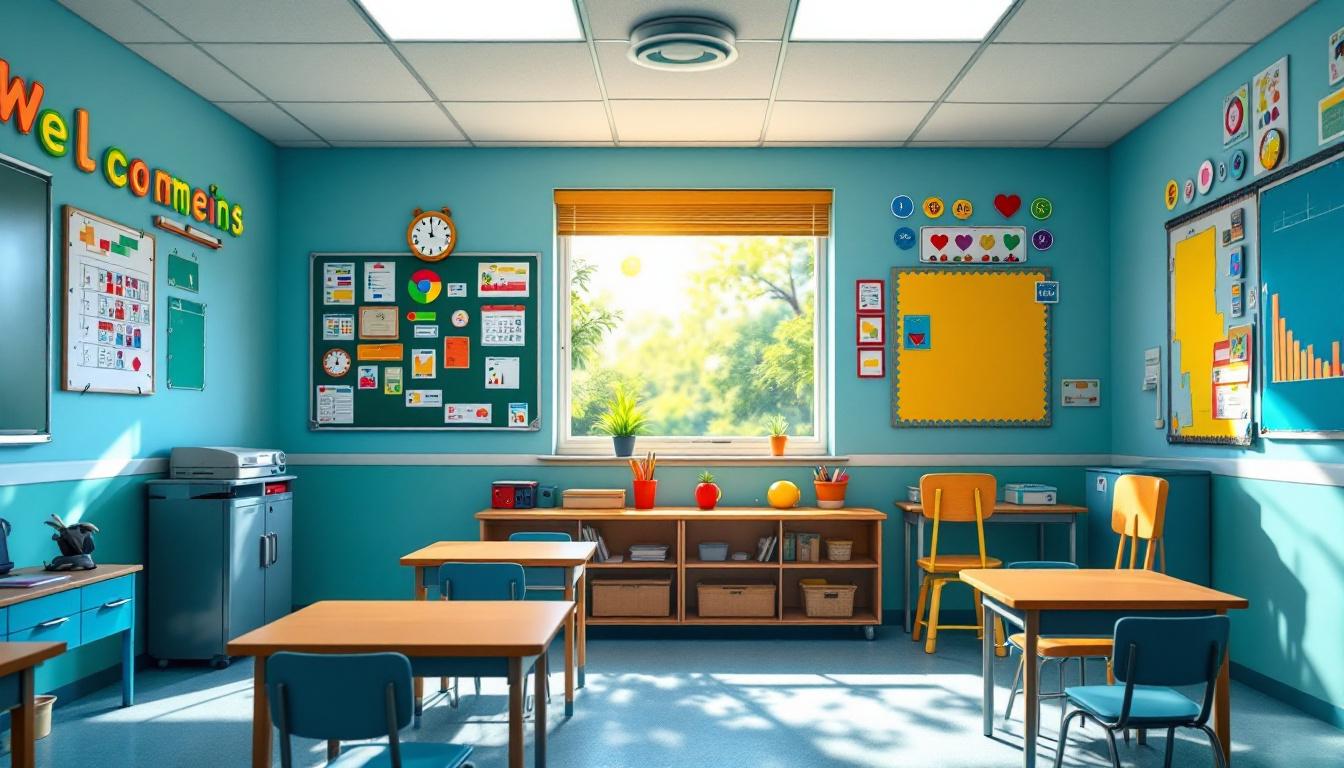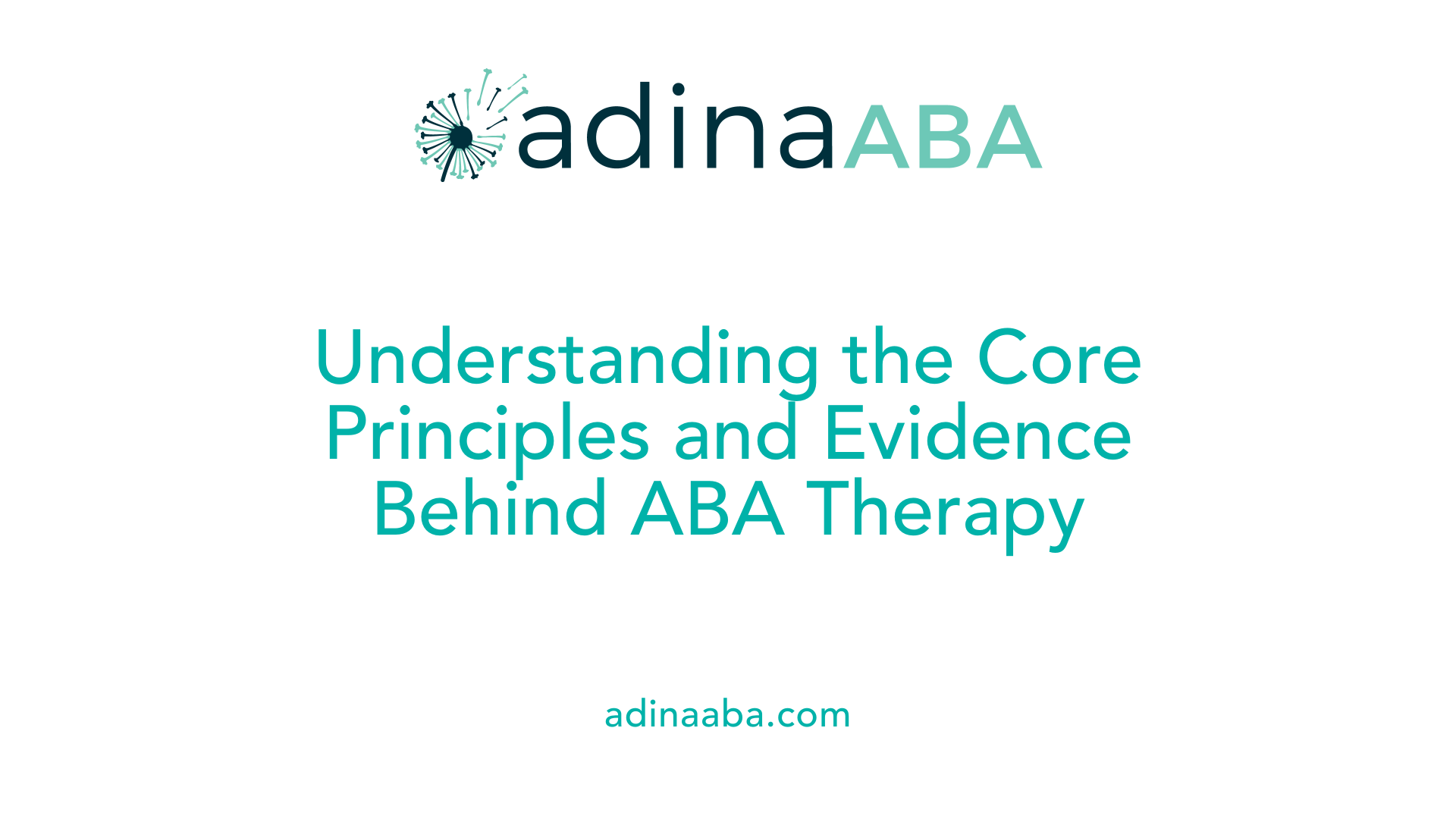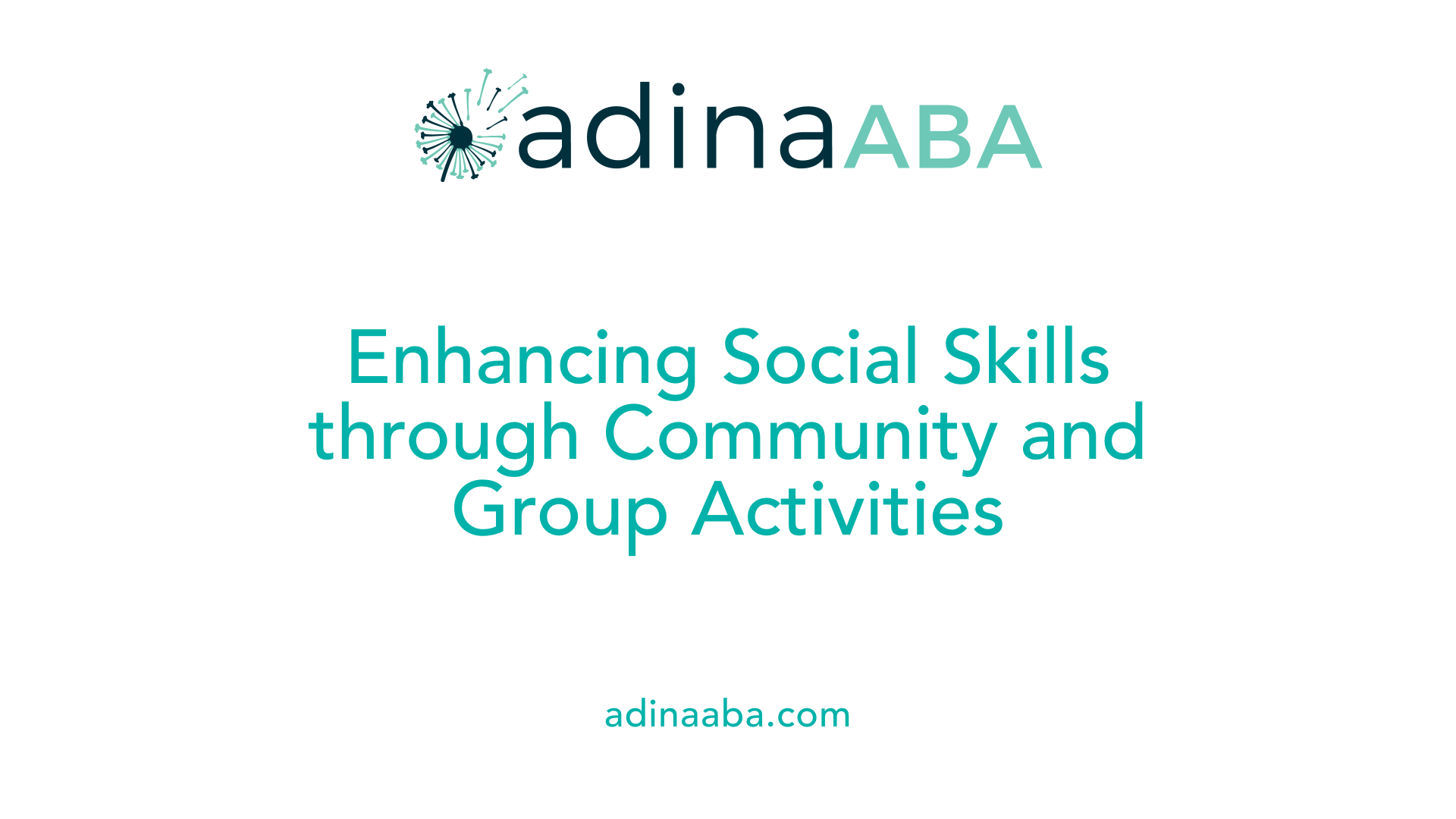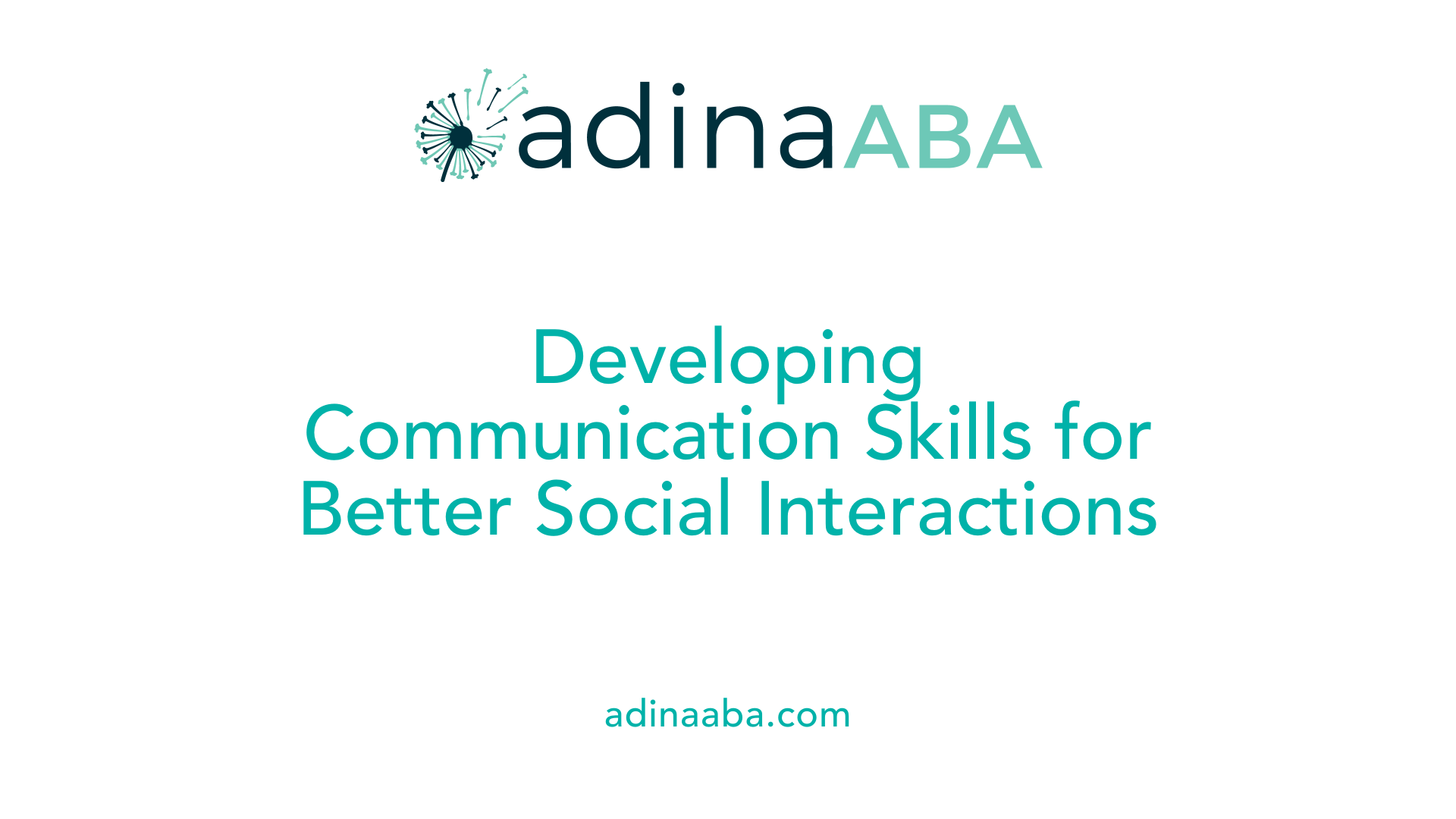Can ABA therapy help with social skills development in teens

Understanding the Impact of ABA on Teen Social Skills
As teenagers navigate complex social environments, developing effective social skills becomes a crucial part of their growth and independence. Applied Behavior Analysis (ABA) therapy, renowned for its success with children with autism, has shown promising results in enhancing social abilities among teens. This article explores how ABA therapy can be tailored to meet the social development needs of adolescents, highlighting its techniques, benefits, and real-world effectiveness.
The Foundations of ABA Therapy and Its Evidence Base

What are the basic principles of ABA?
Applied Behavior Analysis (ABA) is grounded in understanding how behavior functions and how it is influenced by the environment. Its core principles include behavioral modification, positive reinforcement, and individualized intervention plans. ABA uses data-driven strategies to identify and reinforce helpful behaviors while reducing problematic ones.
Therapists tailor programs to each individual's strengths and needs, often involving detailed assessments, functional behavior analysis, and task analysis. Techniques such as prompting, fading, and modeling help children learn new skills step-by-step. ABA emphasizes repetitive practice and reinforcement to encourage the development and generalization of skills across settings.
How does ABA support social skills development?
ABA therapy employs specific strategies to improve social skills, including role-playing, social stories, video modeling, and peer-mediated instruction. These methods teach children how to interpret social cues like facial expressions and body language, take turns, initiate conversations, and engage in reciprocal social interactions.
The structured environment of ABA allows children to practice social behaviors repeatedly with support from therapists. Positive reinforcement encourages children to use these skills more frequently, leading to increased confidence in social situations.
Group social skills training further helps children transfer learned behaviors to real-life interactions with peers, fostering teamwork and communication.
What evidence supports ABA in social skills development?
Research robustly supports ABA as an effective intervention for improving social skills in children with autism. Over 20 scientific studies demonstrate that ABA techniques significantly enhance communication, social engagement, and adaptive behaviors.
Techniques like Discrete Trial Training (DTT), Natural Environment Teaching (NET), and video modeling have shown to help children understand non-verbal cues, start conversations, and participate actively in group activities.
Early intervention with ABA is particularly effective, with benefits increasing with intensity and consistency. Incorporating family involvement and community-based skill generalization further boosts outcomes.
How does ABA help teens enhance social independence?
For teenagers, ABA focuses on more complex social skills such as understanding emotions, empathy, conflict resolution, and social problem-solving. Personalized programs teach teens how to navigate adult social settings, manage social anxiety, and develop everyday life skills like shopping, transportation, and self-care.
Using role-playing, video examples, and peer interactions, teens learn to recognize non-verbal cues and initiate sustained conversations. These skills support increased social inclusion, confidence, and independence, enhancing their overall quality of life.
| Key Techniques | Focus Area | Outcomes |
|---|---|---|
| Discrete Trial Training (DTT) | Skill acquisition | Learning turn-taking, communication |
| Natural Environment Teaching (NET) | Real-life context | Initiating and maintaining conversations |
| Video Modeling | Non-verbal cues | Recognizing facial expressions, body language |
| Social Stories | Social understanding | Better social comprehension |
| Peer-Mediated Instruction | Group skills | Improved teamwork, social engagement |
What is the overall impact of ABA therapy?
When effectively implemented, ABA significantly enhances social skills, communication abilities, and emotional regulation. These improvements contribute to greater social inclusion, independence, and a higher quality of life for children and teens with autism.
Parental involvement and consistent therapy are crucial for long-term success. As a scientifically supported approach, ABA remains a gold standard in autism intervention, with a broad evidence base confirming its effectiveness in fostering social development.
How ABA Therapy is Designed for Teen Social Skills Development
How effective is ABA therapy in improving social skills in teens?
ABA therapy proves to be a valuable approach for enhancing social abilities among teens with autism. Although ABA originated as an intervention for younger children, current research and clinical practice demonstrate its benefits across all age groups, including adolescents.
The therapy focuses on teaching and reinforcing socially appropriate behaviors such as initiating conversations, taking turns, and recognizing social cues. Each teen receives a personalized program based on comprehensive assessments of their strengths and challenges, ensuring the therapy targets relevant social skills.
In practice, ABA strategies like positive reinforcement—rewarding successful social interactions—are used alongside imitation, modeling, and communication training. Techniques such as role-playing, video modeling, and visual supports help teens practice real-life social situations in both clinical settings and everyday environments.
Building independence in social situations is a core goal. Collaboration between therapists, parents, and teachers ensures that skills learned during therapy are generalized beyond sessions. Consistency across the teen's daily routines and social settings enhances skill acquisition and retention.
Overall, when implemented by trained professionals with adolescent-appropriate methods, ABA demonstrates significant effectiveness in helping teens improve in areas such as initiating interactions, understanding social cues, and engaging in reciprocal communication. This progress often leads to better peer relationships, increased confidence, and greater social participation.
Core Techniques of ABA in Social Skills Acquisition
Does ABA therapy help with social skills?
ABA therapy is highly effective in helping children and teens with autism improve their social skills. It uses a variety of evidence-based techniques to teach essential social behaviors, such as making eye contact, taking turns, initiating conversations, and understanding non-verbal cues like body language and facial expressions.
One of the main strategies involves role-playing, where individuals practice real-life social situations in a safe setting. This method helps them learn appropriate responses and behavior patterns through immersive, hands-on experiences. Social stories are another tool used; these are visual narratives that describe social situations and expected behaviors, helping individuals understand how to act in various scenarios.
Modeling is also widely employed, where therapists demonstrate desired social behaviors for the individual to observe and imitate. Video modeling, in particular, allows children to see social interactions in action through videos, making abstract concepts more concrete and accessible.
ABA programs are personalized based on comprehensive assessments of each child's strengths and challenges, ensuring that interventions are relevant and engaging. With consistent practice and reinforcement, individuals gradually develop more functional social skills that they can apply across different settings.
Research consistently supports the effectiveness of ABA in enhancing social skills. When provided intensively and over an extended period, ABA can lead to meaningful improvements in communication, peer interaction, and overall social confidence. Many studies confirm that these efforts help individuals with autism foster better relationships and participate more fully in their communities.
Use of Positive Reinforcement and Conflict Resolution Strategies

How effective is ABA therapy in improving social skills in teens?
ABA therapy is proven to be effective in helping teens with autism develop better social skills. Its personalized approach teaches essential behaviors like initiating conversations, taking turns, and understanding social cues. By consistently rewarding successful social interactions, teens learn to engage more confidently with peers.
The techniques used in ABA, such as role-playing, modeling, and video demonstrations, allow teens to practice real-life social situations in a safe environment. For example, practicing greeting someone or asking for help can be broken down into smaller steps, making them easier to learn.
Special tools like visual supports and social stories are often used to reinforce these skills at home and in the community. This consistency across different settings helps teens generalize their new skills, making them more natural and automatic.
Research and clinical experiences show that when ABA therapy is tailored to each teen's needs and involves collaboration with parents, teachers, and therapists, it produces meaningful improvements in social participation.
Reinforcing social behaviors
Positive reinforcement plays a crucial role in ABA therapy by rewarding appropriate social behaviors. Whether it's making eye contact, sharing, or asking questions, reinforcement encourages teens to repeat these behaviors.
Strategies include giving praise, tokens, or preferred activities immediately after the desired behavior. This not only increases motivation but also helps teens associate positive feelings with social participation.
Teaching conflict resolution and problem-solving
In addition to social skills, ABA focuses on teaching teens how to resolve conflicts and solve social problems skillfully. Through role-playing different scenarios, teens learn to identify problems, consider possible solutions, and choose appropriate responses.
This approach helps reduce social anxiety and promotes independence in handling disagreements or misunderstandings. By practicing these skills in a structured setting, teens gain confidence and are better equipped to navigate complex social interactions in real life.
Group and Community-Based ABA Interventions

What therapy helps kids with social skills?
Several approaches, especially ABA therapy, are highly effective in helping children develop social skills. ABA uses structured programs that incorporate role-playing, social stories, and modeling to teach essential skills like eye contact, taking turns, and understanding others' emotions.
In addition to individual ABA sessions, group social skills training is an important part of intervention. These groups provide a safe environment where children can practice interacting with peers, working on skills such as teamwork, communication, and problem-solving.
Natural Environment Teaching (NET) is another valuable technique within ABA that involves teaching social skills in real-world settings. For example, children might practice asking for help at a playground or sharing toys during playdates, which helps generalize skills beyond therapy sessions.
By participating in group activities and community outings, children learn to apply social skills in everyday situations, boosting confidence and social competence.
Overall, a combination of ABA-based strategies like social skills groups, natural environment teaching, and family involvement creates a comprehensive approach that supports meaningful social development for children and teens with autism. Consistent practice and collaboration among therapists, parents, and educators help children make lasting progress.
How do social groups and natural environment teaching support social skills?
| Technique | Description | Benefits |
|---|---|---|
| Social Skills Groups | Structured peer sessions focused on practicing social interactions | Improves communication, teamwork, and confidence |
| Natural Environment Teaching | Teaching skills in real-life settings such as home, school, or community | Promotes generalization of skills |
| Parent and Peer Involvement | Engaging caregivers and peers in social activities | Reinforces learning and builds stronger social connections |
These methods emphasize engaging children in meaningful interactions that mirror everyday life, ensuring skills are meaningful and adaptable.
How can parents support social skills development at home?
Parents can reinforce skills learned in therapy by encouraging playdates, modeling social behaviors, and using visual supports like social stories or picture schedules. Praising efforts and providing positive reinforcement motivate children to practice new skills regularly.
Community-based activities, such as visits to parks, shopping trips, or community classes, offer additional opportunities for children to apply social skills in diverse settings. Consistent support and practice at home and in the community are crucial for the successful development of social independence in children with autism.
Teaching Non-verbal and Verbal Communication Skills

Does ABA therapy help with social skills?
Yes, ABA therapy is highly effective in enhancing social skills for children and teens with autism. It employs evidence-based techniques like positive reinforcement, modeling, and role-playing to teach social interactions, communication, and appropriate behaviors. Therapeutic programs are customized to each individual’s needs, focusing on developing practical skills such as initiating conversations, understanding body language and facial expressions, and taking turns in social exchanges.
One of the core components of ABA is teaching non-verbal cues, which are often challenging for individuals with autism. Techniques such as video modeling demonstrate body language and facial expressions, helping children interpret these cues more accurately. In addition, ABA therapists use social stories and role-playing to practice initiating and sustaining conversations, making social interactions more familiar and less intimidating.
By breaking down complex social skills into manageable steps, ABA helps children and teens generalize these skills across different settings like school, home, and community. This comprehensive approach ensures that learned skills become natural parts of their daily lives, promoting better social inclusion and confidence.
Parents and caregivers play a crucial role in reinforcing these skills at home. They can support learning by creating opportunities for social practice, modeling behaviors, and using visual supports to facilitate understanding.
Research supports that early, consistent ABA intervention can lead to significant improvements in social communication, reducing social anxiety and helping individuals build meaningful relationships. Overall, ABA therapies provide practical tools to help individuals navigate social cues and foster social growth.
Generalization, Maintenance, and Family Involvement in Social Skills Development
What is skill generalization in different settings?
Skill generalization in different settings refers to a child's ability to apply social skills learned in therapy or structured environments to real-life situations such as home, school, or community settings. For children with autism, acquiring skills in a controlled environment is just the first step. The goal is for these skills to become natural and functional across all areas of life.
In ABA therapy, techniques like Natural Environment Teaching (NET) emphasize practicing skills in diverse, everyday contexts. For example, a child might learn to initiate conversations in a therapy session and then practice the same skills during a playground playdate or at the grocery store. This approach helps children adapt their learned behaviors to various social situations naturally.
Successful generalization depends on several factors, including creating multiple learning examples, involving caregivers and teachers, and gradually increasing the complexity of social settings. Ongoing support in different environments ensures these skills are not only learned but maintained over time.
How can families reinforce social skills at home?
Family involvement plays a crucial role in maintaining and expanding social skills beyond therapy sessions. Parents and caregivers can use various strategies to reinforce what children learn during ABA therapy.
Creating opportunities for regular social interactions is vital. This can include playdates, family outings, or community activities where children can practice social skills like sharing, turn-taking, and asking questions.
Modeling appropriate behaviors is another effective technique. When parents demonstrate polite greetings, active listening, and emotional recognition, children observe and imitate these behaviors.
Using visual supports, such as social stories or visual schedules, helps children understand social expectations and routines, reducing anxiety and promoting positive interactions.
Positive reinforcement is fundamental. Praising children for their efforts and successful social behaviors increases motivation and encourages the repetition of these behaviors.
Incorporating these reinforcement techniques consistently across different settings and situations helps children become more confident and capable in their social interactions, leading to greater independence and integration into their communities.
Parents and Caregivers' Role in Supporting Social Skills Acquisition
How effective is ABA therapy in improving social skills in teens?
ABA therapy has demonstrated strong effectiveness in helping teenagers with autism enhance their social abilities. It employs personalized strategies that focus on teaching and reinforcing positive social behaviors.
While ABA was initially used mainly with younger children, current research and clinical practice confirm its benefits for teens as well. Techniques like positive reinforcement, imitation, and communication training are adapted to suit adolescents' developmental stages.
In therapy, teens learn skills such as initiating conversations, understanding social cues, and joining group activities. These skills are practiced in both structured settings and real-life environments to boost confidence and independence.
Visual supports, social stories, and assistive tools are often incorporated to clarify expectations and facilitate learning. Consistency is vital—parents, teachers, and therapists need to work together to create a supportive atmosphere.
For optimal results, involving trained ABA professionals familiar with adolescent needs is crucial. They can tailor programs that help teens navigate social settings, develop friendships, and improve communication, ultimately leading to a more integrated and fulfilling social experience.
How can parents support social skills development at home?
Parents and caregivers play a critical role in reinforcing social skills outside of therapy sessions. They can create opportunities for their children to practice social behaviors in everyday life.
At-home reinforcement includes praising attempts at social interactions, modeling appropriate behaviors like polite greetings or sharing, and encouraging in-person social opportunities such as playdates or community events.
Using visual supports like schedules or social stories helps children understand social expectations and manage their responses.
By actively participating in their child's social learning—through role-playing games, encouraging conversations, and providing positive feedback—parents can significantly enhance skill retention and generalization.
Overall, a collaborative approach that integrates clinical techniques with daily family practices fosters a supportive environment where social skills can flourish.
Building a Brighter Social Future for Teens
As teenagers strive for greater independence and meaningful connections, establishing strong social skills is vital. ABA therapy, with its evidence-based strategies and tailored approach, has proven to be an effective tool in supporting teens to navigate social situations confidently. Through individualized programs, consistent reinforcement, and active family involvement, ABA can significantly enhance social interaction, foster emotional understanding, and promote social inclusion. As research continues to affirm its efficacy, ABA remains a cornerstone in adolescent social development, helping teens build communicative competence and social confidence for a successful future.
References
- Developing Social Skills Through ABA Therapy for Autism
- Harnessing ABA Therapy for Social Skills Development in Autism
- What is ABA Therapy for Teens Really Like?
- ABA Therapy for Enhancing Social Skills in Children with Autism
- How ABA Therapy Helps Teens Develop Social Skills
- How ABA Therapy Improves Social Skills in Children With Autism
- ABA Therapy for Kids Social Skills Development
- ABA Therapy for Teens: Building Independence - Therapyland
- ABA Therapy for Social Skills Development
- Applied Behavior Analysis (ABA) | Autism Speaks
More Resources
Expert Clinicians
Get started today ->



.jpg)
.jpg)
.jpg)
